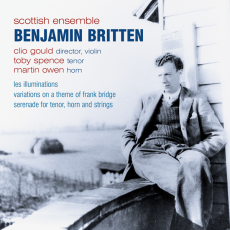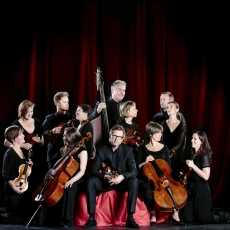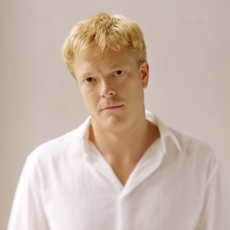Scottish Ensemble - Britten - Atlanta Audio Society
The Glasgow-based Scottish Ensemble, a beautifully honed, rich sounding, dynamic ensemble of 12 strings directed from the violin by Clio Gould, give a most impressive performance of three seminal works of Benjamin Britten. They are, in order of composition date: Variations of a Theme of Frank Bridge, the poetic cycle Les Illuminations, and the Serenade for Tenor, Horn and Strings. Britten penned them all before the age of 30, but we must remember how precocious he was, as he was already at the forefront of English composers when in his twenties.
The Frank Bridge Variations were the 24-year old Britten's tribute to his mentor, who was among other things one of the great masters of the technique of composition for string instruments. This remarkable work can be understood on several levels. It is admiration of Bridge's personal qualities - his integrity, his charm, his wit, his vital energy, and his reverence for the divine. It can also be taken as a sly send-up of various earlier traditions, as paying respects to several of his older contemporaries, and, last but not least, as an exhaustive tour-de-force of all the stunning things an ensemble of strings can accomplish.
I am, unfortunately, less sanguine about Les Illuminations, based as it is on the highly charged imagery of the French symbolist Arthur Rimbaud, whom I personally view as a pretentious literary imposter rather than a legitimate poet. I found it better to put the text aside ("I alone hold the key to this wild parade") and listen to Britten's compelling settings, superbly sung and declaimed by tenor Toby Spence, as "pure" music - something that is admittedly not entirely possible when you have a vocal text.
I found the Serenade an altogether happier experience. Here, Britten skillfully set English poems by Charles Cotton, Alfred Lord Tennyson, William Blake, Ben Jonson, John Keats, and of course, our old friend "Anon." They deal with the theme of the dying of the day and its subsiding into night, and with the poets' various compensations for the metaphorical darkness (loss, guilt, fear and dread, and troubled sleep). The performances by Spence, horn player Martin Owen, and the ensemble are superb in illuminating the wide-ranging poetic texts. How gorgeously Owen's horn and Spence's beautiful vocal diminuendo reinforce the refrain of Tennyson's The splendour falls on castle walls: "Bugle, blow, answer echoes, dying, dying, dying." The anonymous 15th century Dirge is a chilling evocation of the Final Judgment, while Keats' Sonnet provides a balm for hurt minds in the comfort of sleep: "Turn the key deftly in the oilèd wards, / and seal the hushèd casket of my soul."


